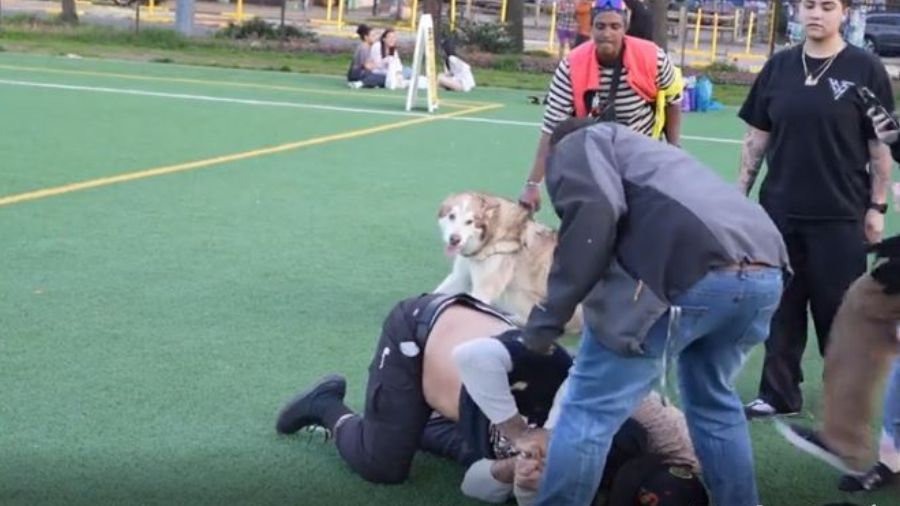WA needs to ‘take strong actions’ to lower risk of overwhelming hospitals
Nov 27, 2020, 12:10 PM | Updated: 3:05 pm

Personnel meet in the trauma surgery ICU at Harborview Medical Center on Nov. 26, 2020, in Seattle, Washington. (Photo by David Ryder/Getty Images)
(Photo by David Ryder/Getty Images)
State and county health officials, as well as Governor Inslee, have warned that Washington could face a loss of medical care if COVID cases overwhelm our hospitals. To share insights as to how close we are to that scenario and what the situation looks like right now in local hospitals, Dr. John Lynch, director of the Infectious Diseases Clinic at Harborview, joined KIRO Radio’s Gee & Ursula Show.
“We are seeing a tremendous number of new cases in King County, in Seattle, in Washington state, and those increasing number of cases are definitely transitioning into hospitalizations,” Lynch said. “And we’re seeing that at UW Medicine facilities, especially in South King County. My colleagues at Valley Medical Center are seeing a lot more patients, and we are as well here at Harborview. It is definitely a troubling trend.”
Hospitals in Washington state at record capacity, doctor says
At this time, Dr. Lynch says medical facilities, hospitals, and clinics in the state are well-staffed and able to provide all the care that is appropriate. However, they are starting to think about what it would look like if the current trends continue.
“This isn’t one week, two weeks, or even a month. This is something that could potentially be growing, increasing over the next several months,” he said. “And if we get the point where we don’t have enough resources, we enter into what’s called the crisis standards of care, which Governor Inslee mentioned. And I want to also be clear that decisions around those are made at the state level and at the regional level, those aren’t decisions that hospitals make.”
“Should that ever happen, … the extreme concern they’re seeing in other states is where the potential for rationing care starts playing a role,” he said. “So instead of focusing on the absolute best way to take care of a patient, you’re looking at what’s the absolute best way to keep a health system functional.”
Managing COVID fatigue
Among the general public, there is rising COVID fatigue at a time when cases are increasing. There are also a number of people who claim that this virus is no worse than the flu, but Dr. Lynch says it is very different, and very serious.
“Fortunately, so far, we haven’t seen an uptick in influenza,” he said. “And what I would say is different this year with COVID-19, what makes SARS-CoV-2 different is that when you look at the absolute number of people infected, the proportion of people who are are getting hospitalized is much greater. And the fatality rate overall also appears to be greater, but I would say is really, really, really elevated in at-risk groups, particularly older adults.”
“… It is also important to recognize that when you’re looking at this many infections happening, we’re seeing people ending up in the hospitals, and clinics, emergency departments across the entire age spectrum,” he added. “And unfortunately, that’s also true in critical care. I’ve talked to colleagues at Seattle Children’s and other facilities, and there are people in the ICUs across every age group, and the absolute numbers far, far, far exceed anything we’ve seen with influenza.”
Lynch, who has been following influenza trends for over a decade on a daily basis, says they’ve never seen anything like this before.
“You’ve seen the national statistics. We’re well over 250,000 deaths in the United States, an incredible number of infections. And those are numbers that we do not see with influenza on a yearly basis,” he said.
The fatigue is being felt in the medical community as well.
“I get it. I understand that completely. I’m exhausted,” he said. “I think everyone I know in the community is exhausted by this, but I will just let folks know that the people at the bedside who are doing this care, they feel that pandemic fatigue 100 times over.”
“To see yet another wave that is going out into the future indefinitely is overwhelming and more than exhausting,” he added. “… What we need to do as a community is to do take every action to prevent folks from getting sick with COVID-19 to help support these folks. You can just imagine if you’re at the bedside in the ICU as a nurse or respiratory therapist, you’re seeing yet another person admitted with COVID 19, and you see people in bars and restaurants or attending large group gatherings out in the community, how that dissonance impacts your mental health.”
For now, Lynch says they have enough PPE and staff, but the real concern is what things will look like in a month, or even further down the line.
“We have enough people to take care of patients, as we always have, to maintain a very safe environment, do all the medical care that is appropriate,” he said. “But we are taking actions in order to create more space and more staff.”
UW Medicine and other local facilities, he says, have already started to dial back many non-urgent surgeries in order to free up staff and beds.
“But what makes a hospital bed is the team that surrounds the bed and the patient who’s in it,” he said. “And those teams are … our most valuable resource. And we’re definitely seeing across the country a shortage, and going back to [the] question around resources and crisis standards of care, it is more likely than not that the most stressed part of all this is staff.”
“We can talk about PPE, we have lots of ways to mitigate that. But you cannot create a new respiratory therapist with the skill to operate a ventilator or to assess a patient. You can’t create a critical care nurse, or an acute care nurse, or an ICU doctor right out of thin air,” he added. “There’s ways to mitigate it. But that’s really, probably the most stressful part of this.”
Virologist says it’s not a given we’ll be ‘back to our normal lives’ by May
Dr. Lynch said we still have a long way to go in fighting off COVID-19 and flattening the curve. Thankfully, there are individual actions we can take to help limit the spread of this virus.
“We have months ahead of us of potentially increasing numbers unless we take strong actions that to turn that down, like we did in prior surges,” he said. “And that’s across the board. It’s bars, it’s restaurants, it’s the gatherings. It’s lots and lots of different things where we interact with folks, particularly with masks off. So get used to the masks. This is part of the current normal for the coming months, throughout the winter season.”
“There is potentially a light at the end of the tunnel here. The information around the vaccines is extremely promising, but it is going to take time to get that out to folks,” he added. “And so next year is really about how can we all work together to get all of us that point of vaccination.”
Listen to the Gee and Ursula Show weekday mornings from 9 a.m. – 12 p.m. on KIRO Radio, 97.3 FM. Subscribe to the podcast here.













